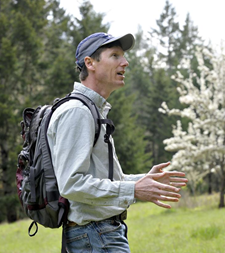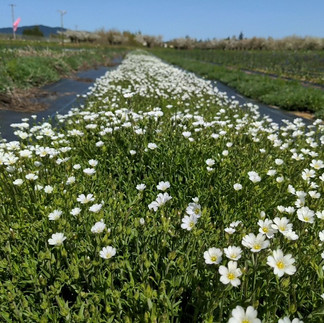
In our ongoing exploration of who gardeners are, where gardeners are, what they are growing in this world, and why that matters to all of us, I am pleased to be joined this week by three members of the team at The Institute for Applied Ecology – literally ecology in action.
Their mission is to conserve native species and their habitats through restoration, research, and education. They envision a world where all people and wildlands are healthy and interact positively, biological diversity flourishes, and environmental challenges are met with a social commitment to solving problems with scientific principles. And in many ways, this all comes back to an abundant and healthy seed supply.
Which brings us to the Institute’s Native Seed Network and their coordination of their upcoming National Native Seed Conference, being held virtually Feb 7th and 8th.
The conference connects research, industry, land management, and restoration professionals, providing the premier opportunity to develop relationships and share information about the collection, research and development, production, and use of native plant materials. Given that gardeners are land managers in their own right, this is the kind of information that informs good garden decision making for all of us. And I am excited to serve as the keynote speaker for the event.
Alexis Larsen, Program Director for the Institute's Plant Materials Program, Morgan Franke, the Program Coordinator for the Plant Materials Program, and Tom Kaye, the Institute’s co-founder, Executive Director, and Senior Ecologist, join Cultivating Place this week to share so much more about the past, present, and future of this important work.
The IAE's Native Seed Network was created by the Institute in 2002 as a resource for people working to add native plants back into the landscape. The network engages with and serves land managers, seed producers, and restoration professionals in order to share information about native seed and improve knowledge about and access to native seed.
The Native Seed Network connects people and organizations involved with all aspects of native seed, from collection, development, production, and use in restoration. Their vision is for restoration and rehabilitation projects to be supported by an abundance of quality seed that is both appropriate for the site and affordable.
The National Native Seed conference connects research, industry, land management, and restoration professionals, providing the premier opportunity to develop relationships and share information about the collection, research and development, production, and use of native plant materials.
Images courtesy of The Institute for Applied Ecology, all rights reserved.
Enjoy!
You can register for the upcoming conference here: https://appliedeco.org/nnsc24/
You can follow the Institute for Applied Ecology's work online: appliedeco.org/ and on Instagram: @applied_ecology
If you enjoyed these programs, you might also enjoy these
Best of CP programs in our archive:
JOIN US again next week, when we revisit the moving voice and story of poet and gardener Camille Dungy’s journey to her personal and moving story: SOIL the Story of a Black Mother’s Garden. That’s next week, right here, listen in.
Cultivating Place is made possible in part by listeners like you and by generous support from
supporting initiatives that empower women and help preserve the planet through the intersection of environmental advocacy, social justice, and creativity.
Thinking out loud this week....
I love to think of all of our gardens as being applied ecology. That’s what they are. They are too applied artistry, applied design, applied spirit also – but applied ecology allows a whole other perspective doesn’t it?
I am wondering how many other people out there listening picked up on the importance of noted by grassland restoration ecologist Justin Luong last week and the crew at The Institute for Applied Ecology this week about the importance of not just research, not just ecology and science, but also of communication – effective and wide-reaching communication across these fields – for the true impact and reach of the work to grow to full potential – for not reinventing the wheel, for not staying siloed in our experience or knowledge or even stuck places.
It's one of the reasons I do what I do – to learn more myself by listening to a wide array of growing humans and their wide ranging endeavors, and to communicate back and forth with all of you. It’s a sublime and reinforcing circle – keeping all of us open and in communication.
Thanks for listening, thanks for responding, thanks for sharing these growing conversations on in the world.
WAYS TO SUPPORT CULTIVATING PLACE
Cultivating Place is a co-production of North State Public Radio, a service of Cap Radio, licensed to Chico State Enterprises. Cultivating place is made possible in part listeners just like you through the support button at the top right-hand corner of every page at Cultivating Place.com.
The CP team includes producer and engineer Matt Fidler, with weekly tech and web support from Angel Huracha, and this summer we're joined by communications intern Sheila Stern. We’re based on the traditional and present homelands of the Mechoopda Indian Tribe of the Chico Rancheria. Original theme music is by Ma Muse, accompanied by Joe Craven and Sam Bevan.
SHARE the podcast with friends: If you enjoy these conversations about these things we love and which connect us, please share them forward with others. Thank you in advance!
RATE the podcast on iTunes: Or wherever you get your podcast feed: Please submit a ranking and a review of the program on Itunes! To do so follow this link: iTunes Review and Rate (once there, click View In Itunes and go to Ratings and Reviews)
DONATE: Cultivating Place is a listener-supported co-production of North State Public Radio. To make your listener contribution – please click the donate button below. Thank you in advance for your help making these valuable conversations grow.
Or, make checks payable to: Jennifer Jewell - Cultivating Place
and mail to: Cultivating Place
PO Box 37
Durham, CA 95938





































